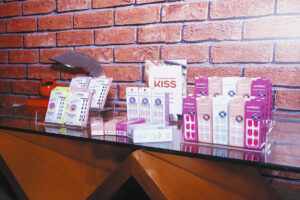and Press-on Nails
NAILS may not be the top priority when it comes to one’s morning routine, but for the brand Kiss, present in all of America’s major stores (Ulta, Walmart, Target; name it), nails have put an edge on the industry.
James Park, Kiss Senior Vice-President for Nail Division and Senior Vice-President and General Manager for Kiss International Business Division, in an event in Makati on July 16, told us about the results of market research they did back in 2011. According to him, the market for nail polish was five times greater than for “fashion” (read: press-on) nails. “This year, we surpassed nail polish.”
Kiss was born in 1989 as a nail salon started by John Y. Chang, Sung Yong Chang, and Won Shik Kang in Flushing, Queens (home of The Nanny’s Fran Fine).
Kiss represents the Asian-American immigration story: in the 1970s, after the end of the Vietnam War, actress Tippi Hedren flew in her personal manicurist to train Asian women to do nails after a visit to a refugee camp. Korean immigrants started to dominate the industry in the 1980s. In a study called “Nail File: A Study of Nail Salon Workers and Industry in the United States” by the UCLA Labor Center and California Healthy Nail Salon Collaborative (Sharma, P., Waheed, S., Nguyen, V., Stepick L., Orellana, R., Katz, L., Kim, S. Lapira, K. 2018), it cites that there were over 2,000 Korean-owned nail salons in the New York metropolitan area.
As for Kiss, by 1992, they had begun to sell their nail products in Walgreens stores, hitting the mainstream.
“The nail salons are run by a lot of the Koreans, and now you see a lot of the Vietnamese doing it in the USA. Not just in LA, but in New York as well,” said Mr. Park. He called himself a “1.5-generation” immigrant, meaning he came to America as a young person (his parents form a full first generation). “I was able to study and build a career. The first generation, they really didn’t have that opportunity. So they end up doing something skill-set [based].
“We see a lot of the women now — I see my mom, worked. The first generation, they had to work. I see a lot of young people working as well. They’re professionals. They’re no longer homemakers. By us providing this type of product, they could continue to maintain beauty,” he said.
As for the name, Mr. Park said, “I asked the same question about 30 years ago,” he said. “How perfect the name is. Nobody will forget. And it’s red,” he said, referring to their logo.
During the July 16 event, stations were set up to show off the brand’s line of false nails, lashes, and hairstyling products. The brand holds something like 300 patents.
“I always tell my team this: don’t think about what you want; think about what your customer wants,” said Mr. Park on their innovations.
“We’re constantly thinking about little minor things… we have to work with the plastic. We have to work with the mold, to make sure it fits people perfectly.” As an example, he cited one of their products, designed to mimic the look of French manicures (natural-colored nails with the signature white tip). He said that the tip used to be painted on. “We created tool injection” in which the white plastic was merged with beige or pink plastic in a machine, forming one nail. “So it doesn’t chip,” explained Mr. Park.
The company is over 35 years old, and is available in over 100 countries in the world. “Longevity is innovation. And passion,” said Mr. Park.
“I tell the team: you’ve got to love what you’re doing,” he said. And this, he thinks, is the reason why the products fit so well in the Philippines. “A lot of the women here, I see, are very passionate.”
iFace is the official distributor of KISS products here in the Philippines, with the products sold in Watsons. — Joseph L. Garcia
